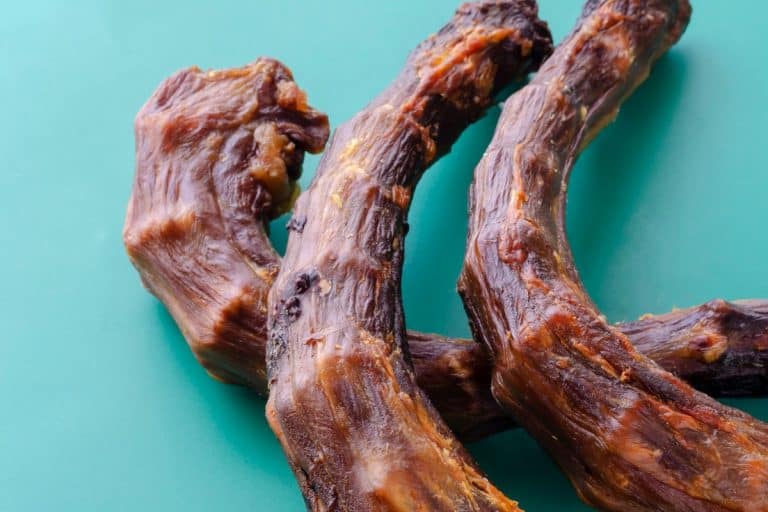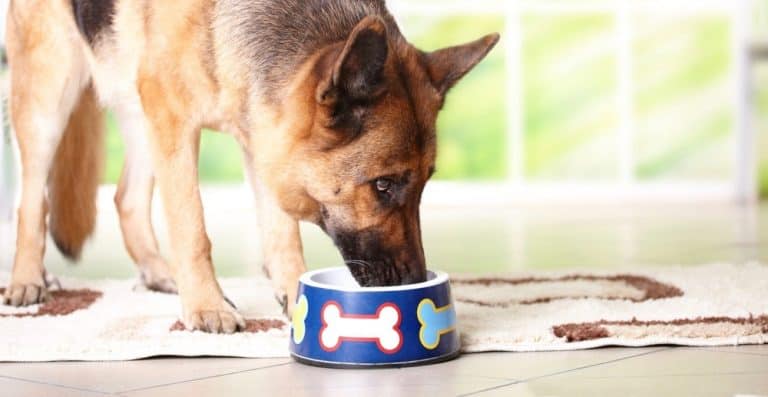Can Dogs Eat Pork Rinds?
Dogs are known for eating a wide variety of foods. Though dogs mainly eat meat, they are known to consume other foods found on the floor, even if they are not intended for the pet.
As a result, it can be difficult to keep on top of what foods are suitable for your dog.
For instance, you may assume that pork rinds are perfectly acceptable for dogs to eat. After all, most dogs enjoy eating delicious pieces of pork. In this guide, we will answer whether or not pork rinds should be fed to dogs.
What Are Pork Rinds?
Pork rinds refer to a pig’s skin. People eat these rinds as snacks and they are particularly popular in the United States, Mexico, and the United Kingdom. They can be served in different ways.
For instance, fried pork rinds are a common delicacy. In the UK, these pork rinds are served as scratchings, which are popular snacks in pubs and bars.
Are Pork Rinds Healthy?
Despite their deliciousness, pork rinds are not considered healthy. This is because they do not contain high amounts of vitamins or minerals.
Instead, they are rich sources of protein and fat. This means that pork rinds have little benefit to a person’s diet.
Protein can be beneficial to the diet, as it helps to retain muscle mass. Therefore, it is widely consumed by bodybuilders, athletes, and gym enthusiasts.
On the other hand, excessive quantities of protein will transform into fat, resulting in people putting on weight. Meanwhile, large quantities of fat in your diet can lead to obesity.
Though it is fine to have a small amount of fat in a diet, you should avoid having one that is filled with fatty foods.
Pork rinds are not carbohydrates, which sets them apart from other snack foods, such as potato chips. As a consequence, they are often featured on carbohydrate-reducing diets.
In fact, if you are looking to avoid carbs but increase your protein intake, then pork rinds can be an optimal option.
For example, pork rinds can be eaten as part of a paleo diet. Another potential benefit of these rinds is that they are incredibly low in sugar.
Moreover, as processed foods, pork rinds can contain excessive sodium. When eating pork rinds, people tend to fill a large percentage of their daily intake of sodium.
This can be harmful to your health, as sodium-rich diets can increase blood pressure. This can lead to heart problems, namely heart disease.
Overall, while there are some benefits to pork rinds, they are not the healthiest of foods. Thus, people can eat them as occasional snacks, but they should not frequently occur in your diet.
Can Dogs Eat Pork Rinds?
No, it is not advised that you give pork rinds to your dog. While they can safely eat pork and other types of meat, such as chicken or beef, they should not consume pork rinds.
These snacks are designed for consumption by humans, not dogs. Though humans can eat them infrequently as part of a healthy diet, dogs should never be fed pork rinds.
You might be curious as to why this is. Here are the answers:
Why Should Dogs Not Eat Pork Rinds?
This is because of the unhealthiness of pork rinds, as described above. These unhealthy qualities translate to dogs, too.
If they eat pork rinds, your dog will also have high amounts of sodium and fat in their diet. This can lead to them putting on excessive weight, which can cause lots of canine health problems.
If your dog has a diet that is too rich in fat, it can develop chronic or acute pancreatitis. This can be a serious health condition.
If you suspect that your dog has pancreatitis, you should contact a vet immediately to get your beloved pet checked out.
Another reason why pork rinds should not be given to dogs is that they may contain ingredients that are harmful to dogs. These rinds are often coated in seasonings, which may not be suitable for canines.
While you can check the ingredients to see whether these rinds have any ingredients that may be harmful, we advise taking a cautious approach and refrain from handing your dog pork rinds.
What Is Pancreatitis? How Does It Affect Dogs?

Pancreatitis is a condition whereby the pancreas becomes swollen and inflamed. For dogs, it can be a result of consuming too much fat.
If you feed a dog pork rinds that have been deep fried, you increase their chances of developing the harmful condition. Other factors can also cause and contribute to the development of pancreatitis, such as obesity.
You should familiarize yourself with the symptoms of pancreatitis so that you can see whether your dog displays them. Some of the key symptoms of this condition are:
- Lethargy
- Hunched back
- Diarrhea
- Dehydration
- Sickness
- Reduced appetite
- Collapsing
Luckily, pancreatitis can be treated by vets via medications. However, if your dog does not receive sufficient treatment in time, it can result in their death.
This is why we strongly reject the idea of feeding dogs foods that are high in fat, like pork rinds. That is why so few human foods are good for dogs, as they tend to contain too much fat and sodium.
There are two different forms of pancreatitis, namely acute and chronic. Acute pancreatitis comes on quickly. Therefore, your dog may not have expressed symptoms before.
Meanwhile, chronic pancreatitis is more gradual. Your dog may have been diagnosed with pancreatitis before. With both varieties of pancreatitis, the severity can differ wildly.
While dogs can technically consume pork rinds without becoming ill, we believe that it is not worth taking the risk. This is especially true given the wide range of nutritious snack alternatives that are available to dogs.
What Snacks Can I Feed My Dog?
As most dog owners will already know, dogs are omnivores that mainly eat meat. This is normally provided in the form of wet or dry dog food.
These foods are made with a mixture of meat, vegetables, and water proteins. This is to ensure that dogs get sufficient vitamins and minerals.
Aside from dog food, which is normally incorporated into a dog’s main meals, there are a few different snacks that you can try.
These snacks are designed to be much healthier for your dog than pork rinds. You can try a few of these snacks to find the one that your dog prefers.
Fruits
An amazing snack for your dog is an apple. They are extremely nutritional, being high in vitamins A and C. If you plan on giving your dog an apple, remember to remove the core and any seeds, as these are not suitable for dogs.
Other foods that your dog will likely enjoy include watermelon, bananas, strawberries, blueberries, and oranges. With a lot of these fruits, it is recommended that you avoid giving them peels.
As with some fruits, such as watermelons, you should also avoid feeding them the seeds. This is because these seeds can contribute to health conditions, such as the aforementioned pancreatitis.
This does not mean that you can give your dog any fruit. For instance, grapes and raisins are toxic to dogs. Tomatoes can also be quite risky, so we recommend keeping away from them.
Though fruits make great dod snacks, you should bear in mind that fruit does not need to be a massive part of their diet. They can get nutrients from elsewhere.
Also, fruits can be high in natural sugars. These sugars are just as harmful to dogs as they are to humans, causing obesity and tooth-related problems.
Furthermore, you should wash fruits under running water before handing them to your dog.
Vegetables

If your dog likes crunchy foods, you can give them carrots. These orange veggies are good courses of vitamin A, B6, and C, as well as calcium and fiber.
You can either feed raw or cooked carrots to your dog, though many prefer the texture of raw carrots. If your dog has weak teeth, cooked carrots may be better suited.
Alongside carrots, some of the best vegetables for dogs are broccoli, celery, green beans, kale, peas, and spinach.
These vegetables tend to contain high amounts of vitamins, minerals, fiber, and antioxidants, all of which can improve your dog’s health.
There are also some vegetables that should be cooked before they can be eaten by dogs. This is the case with potatoes, pumpkins, and sweet potatoes, which must be cooked first.
Potatoes are similar to tomatoes in that they contain solanine. This can be harmful to dogs, hence why we do not recommend giving them tomatoes.
Cooking potatoes reduces the levels of solanine so that they are safer for dog consumption.
As with fruits, some vegetables should not be given to dogs. Among these vegetables are onions and mushrooms, which are poisonous to dogs.
In fact, all allium vegetables can be dangerous for pets, including dogs. This family consists of onions, garlic, chives, and leeks, so it is best not to give them to your canine.
Other Foods
A popular dog treat is peanut butter. Most dogs love having a teaspoon of peanut butter every now and then. If you give your dog peanut butter, double check that it is pet safe.
Please keep away from peanut butter brands that contain chocolate or xylitol. This is because dogs cannot break down theobromine, which is found in chocolate.
Meanwhile, xylitol is toxic to dogs. Otherwise, peanut butter makes for a brilliant treat for dogs when taken in moderation.
You can also give your dog some fresh meat if they are getting bored with standard dog food. The best cooked meats to give dogs are chicken, beef, and turkey.
Like pork rinds, there are lots of other foods that you should give a miss when planning a dog’s diet.
Aside from chocolate, you should also never give your dog macadamia nuts, dairy products, caffeine, sugary drinks, desserts, ice cream, and almonds.
Frequently Asked Questions
How Can I Keep My Dog Healthy?
To ensure that your dog is healthy, you should follow our dietary advice above. Make sure that you feed them the correct food. This includes avoiding foods that are harmful or unhealthy.
Also, make sure that you give your dog the recommended portions. Food options should differ depending on the age of the dog. Puppies will need to eat less food than adult dogs.
Moreover, some breeds will require more food than others. Food packaging should contain information regarding suggested portions.
Another important factor is to make sure that your dog gets sufficient exercise. You should take them for regular walks so that your dog can scratch their legs.
At the very least, your dog should get at least 30 minutes of exercise per day. Ideally, they should get a minimum of 60 minutes each day.
Can Dogs Eat Pork?
Yes, dogs can safely consume cooked pork. Though it is best to refrain from offering your pooch pork rinds, pork meat is fine for them to eat.
Just make sure that you have prepared it properly and cooked it thoroughly. Don’t season the meat and be sure to cut it into bite-sized chunks.
Can Dogs Eat Raw Bacon?
No, you should not give your dog raw meat, as it can make them ill. Like humans, raw meat can be damaging to your dog’s health.
We also do not advise giving them cooked bacon, as the high salt content is not beneficial. There are lots of other meats that are more suitable for dogs.
Final Thoughts
Hopefully, this guide will help you to understand why pork rinds can be harmful to dogs.
While humans can eat them infrequently as part of a healthy diet, we strongly suggest that you refrain from providing rinds for your dog.
Instead, you should offer snacks that are nutritional yet tasty, such as fruits and vegetables that are safe for dogs. In doing so, you can ensure that your dog is healthy and happy.






